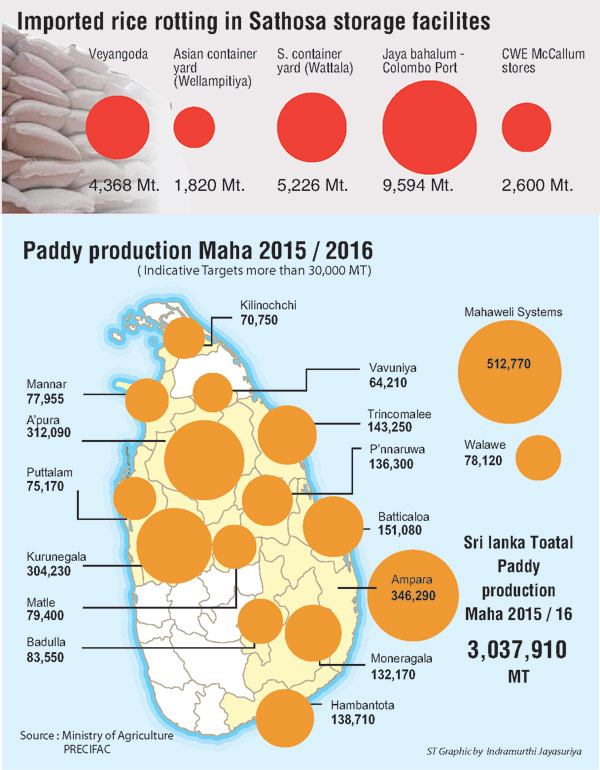News
Blowtorch turned on Sathosa over 32m kg of rotting rice
 The discovery that container-loads of imported rice are rotting in storage facilities and container yards for the past 10 months has turned on the heat on Lanka Sathosa Ltd.
The discovery that container-loads of imported rice are rotting in storage facilities and container yards for the past 10 months has turned on the heat on Lanka Sathosa Ltd.
The Presidential Commission of Inquiry to Investigate and inquire into serious acts of fraud, corruption and abuse of Power, State Resources and Privileges (PRECIFAC) last week said more than 32 million kg of rice had been found in the yards and storage facility of Lanka Sathosa without being distributed to consumers.
Tests done by the Medical Research Institute (MRI) on samples obtained from the containers have concluded that the rice is not fit for human consumption. The MRI report said the samples tested from six storage facilities of the Sathosa emanated a foul smell rendering it “not fit for consumption”.
The rice had decayed due to improper storage and exposure to moisture.
According to the MRI, the stock at the Veyangoda storage facility, the subject of the initial investigation, is suspected to have reached Sri Lanka at the tail-end of 2014 or in the early part of 2015 and had remained in the harbour until the end of 2015.
Further investigations by PRECIFAC have revealed stocks in five other storage facilities including the Veyangoda Food Department Stores, the Asian Container Yard in Wellampitiya, S. Container Yard in Wattala, Port Container Yard and Sathosa Macallum Stores.
PRECIFAC Secretary Lacille de Silva said as that samples of rice found in all five storage facilities have been deemed unfit for human consumption a cabinet decision was taken to sell the rice as animal feed.
He said huge stocks of rice had been imported into the country without proper planning by the Sathosa authorities and that the commission was also investigating whether large sums of money had been obtained in the form of commissions.
The commission is investigating as to why these container loads of rice have not been distributed to the public even during the last Christmas season when Sathosa experienced a shortage of rice and had rationed distribution to 50kg per person.
Mr. de Silva said that the investigations are being carried out by a police team led by ASP Lalith Abeysekera and Chief Inspector Geethika Bodhipaksa.
He said the wrongdoers would be punished irrespective of their political affiliation and whether they were in the current or former regime. “This is a waste of public funds,” he said.
He said 75 per cent of the investigation was complete and that within weeks PRECIFAC would hold a trial before a five-member commission.
The trial court is to consist of Preethi Padma Surasena (Chairman), Amendera Seneviratne (High Court judge), Vikum Kaluarachchi (High Court judge), Gihan Kulatunge (High Court judge) and P.A. Prematilake (former attorney-general).
Ministry of Industry and Commerce Secretary T.M.K.B. Tennekoon refused to comment apart from saying the spoiled rice would be sold as poultry feed.
In another case of bureaucratic bungling, around 3,500 metric tonnes of paddy stored at the Mattala Airport storage facility is being removed and sold below cost.
It is alleged that the paddy, bought from farmers at Rs. 50 a kilo during the last Maha season and stored at the disused airport, is now being sold to private buyers at Rs. 38 per kilo.
It is alleged that the paddy is being disposed without tender procedures being followed and that alcohol breweries, bakers and biscuit manufacturers are having a field day buying paddy at a low price.
Paddy Marketing Board (PMB) Chairman M.D. Dissanayake said the government had bought paddy from farmers at Rs.50 to help the growers.
He said that now since there was no storage facility the PMB was selling the paddy in the open market to dispose of it quickly. He said 80,000 tonnes had been sold already and that the PMB was planning to sell the balance quantity quickly as the stock at the airport had to be cleared soon.
“We are selling it to anybody who is interested – what they use it for is not known,” Mr. Dissanayake said.
The All-Ceylon Peasant Farmers Association charged that the government was indulging in waste practice and that the paddy could have been milled and sold to consumers.
Association Convenor Namal Karunaratne said although the small mill owners had offered to clean the paddy for distribution the government had ignored them and had opted to sell it to big mill owners and industries including M.S. Mendis, Prima and other biscuit companies.
He said the big mill owners would polish the paddy and sell it at a high price. With the harvesting season in two weeks, Mr. Karunaratne said, this would create a glut in the market, again bringing down the price of paddy. “It is the poor farmer who will be affected,” he said.

